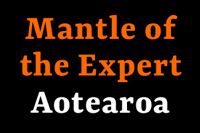Bolton, Changes in thinking about drama Ed
For those who enjoy a bite of theory now and again, this article is an oldie but still a goodie. Gavin Bolton (who has done more than just about anyone else to bring Dorothy Heathcote’s work into classroom practice) wrote this article in the late eighties…. I revisited it the other day and found it as vital and useful as ever (though it is disturbing to note that 30 years on the picture Bolton paints of the uninformed teacher using ‘skits’ and meaningless ‘games’ to teach drama is still one that many of us would recognise today…)
In particular, I enjoy the way Bolton offers a categorization of how drama supports learning. Check out what he has to say about the four ways children learn in drama… He suggests that children learn through
1. metaxis (a dual awareness of the real and fictional worlds)
2. aesthetic and referential attention (appreciation of drama for its own sake – and as an illustration of real world issues)
3. Subsidiary awareness / unconscious awareness (the tacit learning that happens even if teachers or learners don’t notice it happening)
4. Natural or ‘common’ understanding (the stuff we already know, which is reframed and comes to be seen in a new way)
I rather like this elegant characterisation … How does it fit with YOUR understanding of how children learn in a drama / mantle of the expert setting….?
